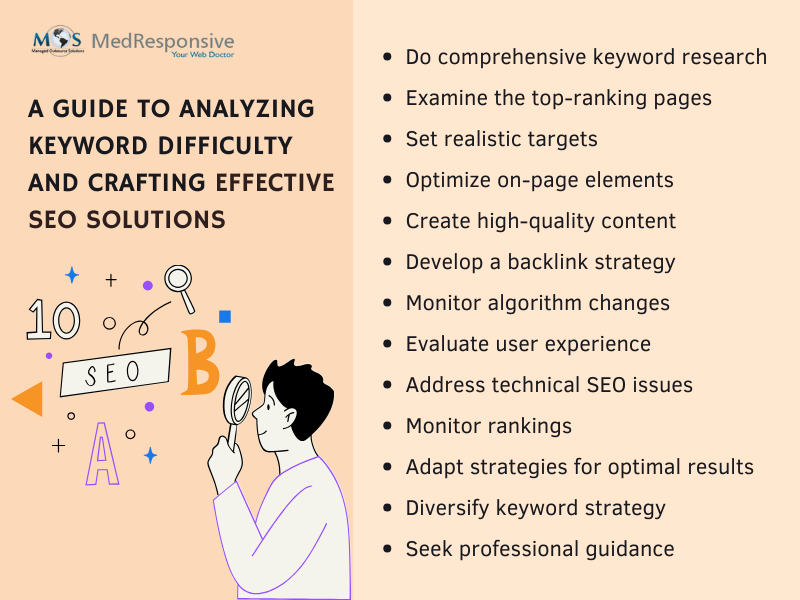Have you ever wondered why some keywords seem almost impossible to rank for, even with great content? That’s what keyword difficulty is. It’s like the “competition meter” of SEO, helping you understand how hard it will be to climb to the top of Google’s search results for a specific term. Whether you’re running your own website or utilizing medical SEO services, knowing how to analyze keyword difficulty for SEO can make all the difference between targeting the right opportunities and wasting time on overly competitive keywords.
What Is Keyword Difficulty?
Keyword difficulty (also known as “SEO difficulty” or “keyword competition”) is the process of evaluating how difficult it is to rank in Google’s organic search results for a specific term. This is based on different factors, including domain authority, page authority, and content quality.
Higher difficulty keywords have a greater number of competing pages, making it more challenging to achieve a higher ranking. It is crucial to understand keyword difficulty so that you can select the right keywords to target and develop effective SEO strategies. A low-difficulty keyword may present an opportunity for quick wins and faster rankings, while a high-difficulty keyword might require more time and effort to rank.
Major Factors Affecting Keyword Competition
Search Volume
Search volume refers to the number of times a specific keyword is searched for on search engines. It provides insights into the popularity and demand for a particular keyword. Understanding the definition of search volume is crucial when determining keyword difficulty. High search volume indicates a greater number of people searching for that keyword, meaning more competition from other websites targeting the same keyword. Conversely, low search volume suggests less competition.
How Search Volume Impacts Keyword Difficulty
Generally, high search volume keywords tend to have higher difficulty levels. This is because popular keywords attract more competitors attempting to rank for them.
To overcome high keyword competition, it’s advisable to focus on long-tail keywords or target a specific geographical area. This way, you can find less competitive keywords with sufficient search volume.
Competition Level
Competitor analysis is an integral part of understanding keyword difficulty. By examining the strategies and performance of other websites targeting similar keywords, you can gain valuable insights. Here are some key points to consider in competitor keyword analysis:
- Analyze their on-page optimization techniques and content quality.
- Explore their backlink profiles and identify potential opportunities.
- Look at their social media presence and engagement levels.
Start by identifying the top competitors in your niche. Analyze their on-page and off-page SEO strategies, including keyword usage, backlink profiles, and content quality. By studying competitor strategies, you can gain insights into the level of competition for specific keywords and tailor your SEO approach accordingly. Keep an eye on their content and social media activity to identify potential opportunities and stay one step ahead.
How Competition Level Impacts Keyword Competition
Understanding the competitor’s strategies, backlinks, and content quality helps gauge the level of effort required to rank for a specific keyword. By analyzing competitors, you can identify areas for improvement and devise strategies to beat them.
Content Quality
High-quality content not only improves your chances of ranking well but also attracts and engages your target audience. To ensure content quality, focus on providing valuable and relevant information that addresses user search intent. Avoid keyword stuffing and prioritize user experience by incorporating visuals and structuring your content with headings and subheadings.
SEO Challenges Posed by Keyword Difficulty
Apart from the factors mentioned above, here are some of the challenges that keyword competition presents in the field of SEO. These common SEO challenges in keyword targeting can affect your ability to rank well in search engine results pages (SERPs) and require careful consideration and strategy. Here are some SEO challenges:
Resource Constraints
Competing for high-difficulty keywords requires significant resources, including time, money, and personnel. An effective SEO campaign provided by a search engine optimization company that targets difficult keywords would prioritize more extensive content creation, backlink acquisition, and ongoing optimization efforts.
Link Building
Building high-quality backlinks is a crucial component of SEO, particularly for competitive keywords. Acquiring backlinks can be time-consuming and requires a well-planned outreach strategy.
Ongoing SEO efforts
Achieving high rankings for competitive keywords takes time. SEO is not an instant fix, and you must be patient as you work to improve your rankings. It may take several months or even years to see substantial results.
Algorithm changes
Search engine algorithms are constantly evolving, which can impact your rankings. Staying updated with algorithm changes and adapting your SEO strategy accordingly is a continuous challenge.
Content freshness
Typically, search engines prefer fresh and up-to-date content. Maintaining the freshness of your content may require regular updates or additions, which can be time-consuming.
Keyword relevance
High-difficulty keywords may not always be the most relevant to your content or target audience. Ensuring keyword relevance while competing in competitive spaces can be challenging.
Building a long-term strategy
Sustaining rankings for competitive keywords is an ongoing process. Many websites will be vying for the same spots, and maintaining your position in the rankings requires a long-term strategy.
User Experience
Search engines prioritize websites that provide a positive user experience. Ensuring your site is fast, mobile-friendly, and easy to navigate is crucial but can be challenging.
Diversification
Relying solely on high-difficulty keywords can be risky. A diversified keyword strategy that includes less competitive, long-tail keywords can help you maintain a stable flow of organic traffic.
How to Address SEO Challenges
Analyzing keyword competition and addressing SEO challenges requires a systematic approach. Here’s a step-by-step guide to help you effectively handle these aspects of SEO:
Keyword Research
Start with comprehensive keyword research using reliable keyword analysis tools like Google Keyword Planner, Ahrefs, SEMrush, or Moz. Identify potential target keywords relevant to your content and audience.
Analyze SEO Difficulty
Use SEO tools to assess the SEO difficulty for each potential target keyword. Most SEO tools provide a score, which is typically based on SEO ranking factors like competition, backlinks, and content quality.
Competitive Analysis
Examine the top-ranking pages for the keyword you want to target. Pay attention to the type and quality of content, backlink profiles, domain authority of competing sites, and their on-page optimization.
Set Realistic Targets
Balance your keyword strategy by choosing a mix of high-difficulty, mid-difficulty, and low-difficulty keywords. It’s essential to choose realistic targets based on your resources and capabilities.
Optimize On-page Elements
Ensure your on-page optimization is top-notch. This includes using the target keyword in the title, headings, meta description, and throughout the content. Optimize images and ensure proper internal linking.
Create High-quality Content
Develop informative, engaging, and well-researched content that thoroughly addresses the user’s search intent. High-quality content is a significant factor in SEO success.
Backlink Building
Develop a backlink strategy to acquire high-quality, relevant backlinks from authoritative websites. This can boost your site’s authority and help you compete for more challenging keywords.
Monitor Algorithm Changes
Stay updated on search engine algorithm changes, as these can impact your rankings. Continuously adapt your strategy to align with the latest SEO best practices.
Evaluate User Experience
Improve your website’s user experience. Ensure it loads quickly, is mobile-friendly, and offers an easy and intuitive navigation structure.
Address Technical SEO Issues
Resolve any technical SEO issues, such as broken links, duplicate content, and issues with page speed. Technical optimizations can positively impact your rankings.
Monitor and Measure
Regularly monitor your keyword rankings, organic traffic, and engagement metrics. Use tools like Google Analytics and Google Search Console to track your progress.
Adjust and Iterate
Based on the data you gather, adjust your strategy as needed. If you’re not seeing the desired results, consider shifting your focus to less competitive keywords or modifying your content and backlink strategies.
Diversify Keyword Strategy
Don’t solely focus on high-difficulty keywords. Diversify your strategy by incorporating long-tail keywords, which are often less competitive and can drive valuable traffic.
Seek Professional Guidance
If you’re facing specific SEO challenges that you’re unable to address on your own, consider seeking guidance from SEO professionals or agencies providing organic SEO services. They can provide expert insights and support.
Keyword competition is a crucial concept in SEO that refers to the level of competition for a particular keyword. It measures the ease or difficulty of ranking for a keyword on search engine result pages. Factors such as domain authority, backlinks, and content quality influence SEO difficulty. It helps SEO professionals determine which keywords to target and develop effective strategies to improve website visibility. With the support of medical SEO services, you can refine your keyword approach and achieve sustainable growth in search rankings.





